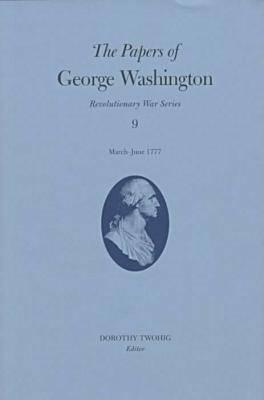- Bible
- Read the Bible
- Bible Versions
- Verse of the Day
- Reading Plans
- Verses by Topic
- Books of the Bible
- Bible Images
- Study
- Commentaries
- Concordances
- Dictionaries
- Encyclopedias
- Sermons
- Bible Atlas & Maps
- BP Wiki
- Devotionals
- Today's Devotionals
- Light of the World
- All Devotionals
- Inspirational Quotes
- More
- Picture Quotes
- Videos
- Inspirational
- Bible Study
- What The Bible Says
- Bible Q&As
- Daily Bread
- Bible by Genre
- Bible Stories
- Random Bible Verse
- Community
- Store
The Papers of George Washington, Revolutionary Series, Volume 9
by George Washington
Volume 9 covers the spring of 1777, a period when Washington's resourcefulness and perseverance were tested as much as at any time during the war. Instead of opening the new campaign by taking the field with a reinvigorated Continental army as planned, Washington was obliged to spend much of his time pleading with state authorities to fill their recruiting quotas and with officers to bring in the men whom they had enlisted. He was further hampered by a high desertion rate, which he blamed on the failure of many officers to pay their men regularly.
Painfully aware of the weakness of his army, Washington was puzzled but relieved that General Howe did not launch a major offensive during the spring. Although British raids on Peekskill, N.Y., Boundbrook, N.J., and Danbury, Conn., stirred local fears, Washington remained focused on the larger threat posed by Howe's forces. Employing a network of spies, Washington attempted to discover whether Howe planned to attack the strategically important Hudson highlands or politically important Philadelphia, and if the latter, whether he intended to move by land or sea. Believing that Philadelphia would be Howe's target but unable to prove it, Washington concentrated most of his forces at Middlebrook, N.J., in late May, in order to be able to move rapidly north or south as events dictated.
Unhappy officers added to Washington's woes with complaints of ill treatment and threats to resign. "It seems to me," Washington wrote John Hancock in April, "as if all public Spirit was sunk into the means of making money by the Service, or quarrelling upon the most trivial points of rank." Foreign officers, who arrived in unprecedented numbers, were the most troublesome. Often unable to speak English and having little attachment to the American cause, they demanded extravagant ranks and pay that could not be granted without disrupting and demoralizing the Continental officer corps. "The management of this matter," Washington wrote Richard Henry Lee in May, "is a delicate point.... In the mean while I am Haunted and teazed to death by the importunity of some & dissatisfaction of others."
Painfully aware of the weakness of his army, Washington was puzzled but relieved that General Howe did not launch a major offensive during the spring. Although British raids on Peekskill, N.Y., Boundbrook, N.J., and Danbury, Conn., stirred local fears, Washington remained focused on the larger threat posed by Howe's forces. Employing a network of spies, Washington attempted to discover whether Howe planned to attack the strategically important Hudson highlands or politically important Philadelphia, and if the latter, whether he intended to move by land or sea. Believing that Philadelphia would be Howe's target but unable to prove it, Washington concentrated most of his forces at Middlebrook, N.J., in late May, in order to be able to move rapidly north or south as events dictated.
Unhappy officers added to Washington's woes with complaints of ill treatment and threats to resign. "It seems to me," Washington wrote John Hancock in April, "as if all public Spirit was sunk into the means of making money by the Service, or quarrelling upon the most trivial points of rank." Foreign officers, who arrived in unprecedented numbers, were the most troublesome. Often unable to speak English and having little attachment to the American cause, they demanded extravagant ranks and pay that could not be granted without disrupting and demoralizing the Continental officer corps. "The management of this matter," Washington wrote Richard Henry Lee in May, "is a delicate point.... In the mean while I am Haunted and teazed to death by the importunity of some & dissatisfaction of others."
BUY NOW
Hardcover, 734 pages
Published May 28th 1999 by University of Virginia Press (first published 1999)
© 2025 Bibleportal.com All rights reserved.

George Washington was the commander of the Continental Army in the American Revolutionary War (1775-1783) and served as the first President of the United States of America (1789-1797). For his central role in the formation of the United States, he is often referred to as the father of his country.
Washington was baptized into the Church of England. In 1765, when the Church of England was still the state religion, he served on the vestry (lay council) for his local church. Throughout his life, he spoke of the value of righteousness, and of seeking and offering thanks for the "blessings of Heaven."
The Electoral College elected Washington unanimously in 1789, and again in the 1792 election; he remains the only president to receive 100% of the electoral votes.
Washington proved an able administrator. An excellent delegator and judge of talent and character, he held regular cabinet meetings to debate issues before making a final decision. In handling routine tasks, he was "systematic, orderly, energetic, solicitous of the opinion of others but decisive, intent upon general goals and the consistency of particular actions with them.
Washington died in 1799. He has been consistently ranked by scholars as one of the greatest U.S. Presidents.
... Show more